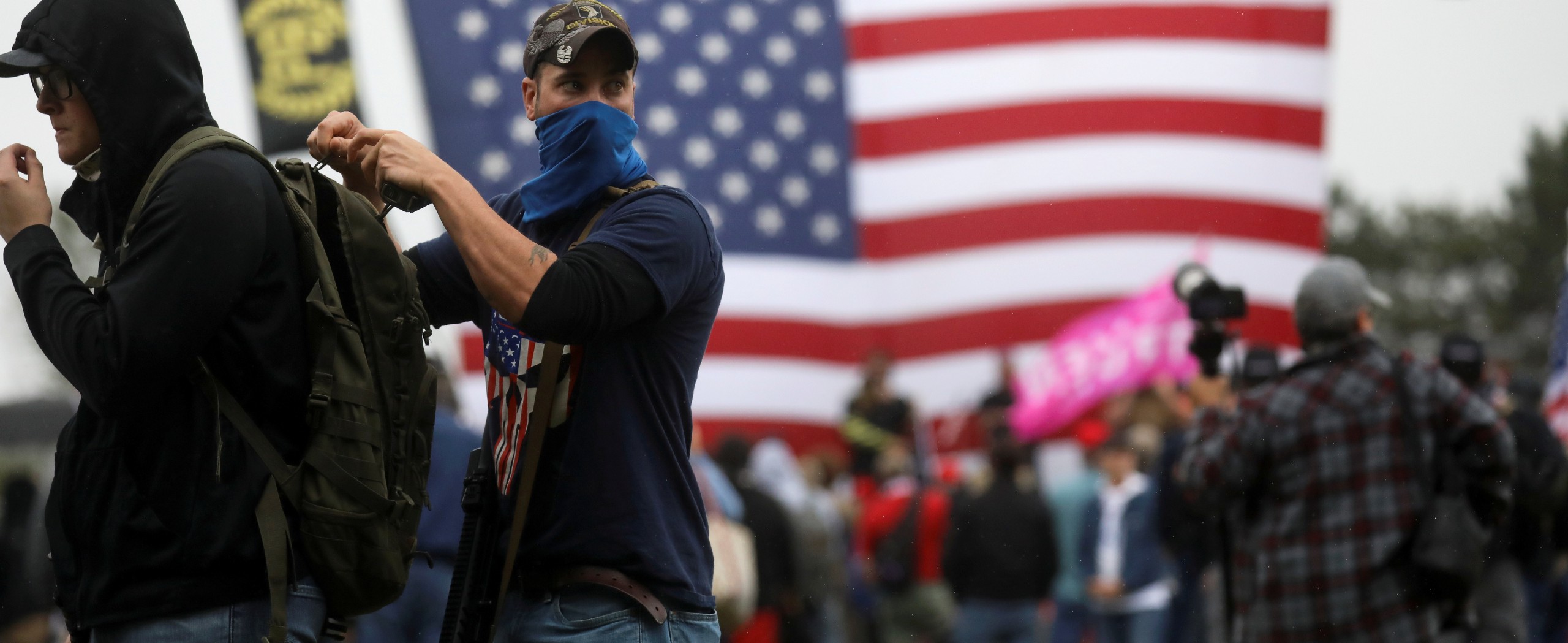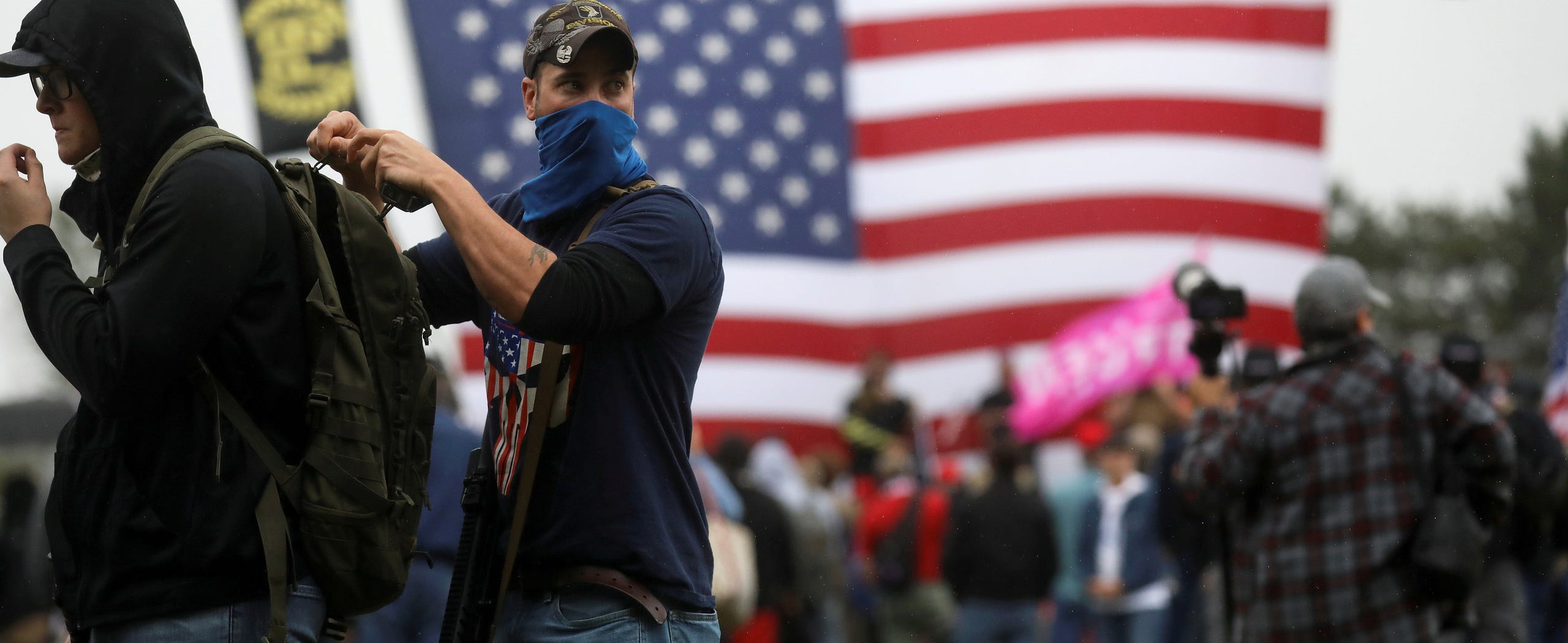#ElectionWatch: What to expect from armed extremist groups on election day
Unlawful militia groups indicate they’re standing
#ElectionWatch: What to expect from armed extremist groups on election day

Unlawful militia groups indicate they’re standing ready for election chaos

Increases in activity and heated rhetoric from domestic extremists have law enforcement and subject-matter experts concerned about potential violence and voter intimidation surrounding the 2020 general election, particularly at the hands of unlawful armed militia groups.
Tuesday’s U.S. election is set to be unlike any in living memory. In the wake of the COVID-19 pandemic, Americans have voted by mail at nearly double the rate as they did in 2016. Several key states will not begin processing mail-in ballots until election day, and officials have advised that it could be days before the winner of the presidential election is evident. Despite this, President Donald Trump and his associates have repeatedly telegraphed that they may preemptively declare victory on election night if it appears he is initially ahead.
Members of extremist online communities have repeatedly hyped the potential for turmoil during or immediately following election day, some going so far as to warn that a civil war may break out in the aftermath. These assertions, often supported by misleading or hyper-partisan information, have encouraged coordination between groups and rank-and-file supporters. Already this year, on-screen violent and hyperbolic rhetoric from extremist actors has foreshadowed real-world chaos in the streets.
Federal agencies have raised concerns that the election could be a flashpoint for a period of increased extremist violence in the United States. The FBI sent a bulletin to law enforcement in August warning that as election day neared domestic extremists were increasingly likely to “plot against government and election-related targets.” The bulletin did not single out any partisan ideology, but subsequent reports from the FBI and Department of Homeland Security have explicitly cautioned against right-wing extremist threats facing the nation. As part of the Homeland Security Threat Assessment from DHS to Congress released on October 6, 2020, Acting Secretary of Homeland Security Chad F. Wolf noted, “Domestic Violent Extremists [are] presenting the most persistent and lethal threat.”
The Armed Conflict Location & Event Data Project (ACLED) and MilitiaWatch report right-wing militias in the U.S. have “steadily ramped up their activities,” creating “significant concerns for the security of the election period, how seriously the election results will be taken, and the response to whichever winner is selected.” Trump has encouraged his supporters to engage in poll watching during this year’s election, as he also did in 2016, and some militia groups have indicated they intend to fulfill that call to action. In some states, officials have enacted preemptive measures meant to guard against the threat of armed groups at polling places.
The Oath Keepers, one of the largest militia movement organizations in the United States, say they intend to engage on election day and the period of time that follows. Stewart Rhodes, who helms the Oath Keepers, told conspiracy theorist broadcaster Alex Jones during a recent interview that members of his organization would be at polling locations to “protect” Trump voters and that some of the group’s “best men” would be stationed in the Washington, D.C., area anticipating “a Benghazi-style attack” against Trump on election night. (Rhodes urged similar actions in 2016 as part of an effort the Oath Keepers called “Operation Sabot.”)
It’s not just the Oath Keepers: other right-wing extremist factions have expressed they intend to involved themselves in election-related activity. Progressive media watchdog organization Media Matters reports that supporters of the QAnon conspiracy theory, which the FBI considers a potential domestic terror threat, and members of a militia movement forum board have encouraged poll watching in both formal and informal capacities. On Oct. 28, a man who claimed to be a Proud Boys member was arrested after threatening to bomb a North Dakota voting location, although Proud Boys organizers have disputed the man’s stated affiliation. Meanwhile, one highly active militia supporter with profiles in several movement group chats has repeatedly encouraged militias to protect GOP elected officials from potential violent threats and has claimed that “Indiana Militia” planned to deploy to the state’s capitol to guard Republican lawmakers.
Mary McCord, legal director of Georgetown University’s Institute for Constitutional Advocacy and Protection (ICAP), told the DFRLab that threats posed by unlawful armed groups won’t end when polls close on Tuesday. (The DFRLab and ICAP work in partnership to study and combat the growth of online extremism and its real-world consequences.)
“Beyond election day, there’s the threat that these armed vigilantes will self-deploy, either claiming to protect against fraud in the ballot-counting or to protect property against what they’ve previously characterized as violent anarchists,” McCord said. “Some are using very hyperbolic references to ‘civil war,’ which would be a complete failure of our democracy. The vast majority of Americans do not want political violence or civil war and need to speak out in unity against the rhetoric of these groups.”
The DFRLab has observed an influx of new individuals in extremist spaces online in recent months. So-called “Three Percenter” groups experienced an influx of applications this year that overwhelmed the group’s vetting procedures, causing formal recruitment to stall out in many states. The often-violent Proud Boys group claimed it received swarms of new recruits after Trump told members of the group to “stand back and stand by” when pressed to condemn white supremacist and militia groups at a presidential debate. “Somebody’s got to do something about antifa and the left because this is not a right-wing problem,” Trump told debate moderator Chris Wallace at the time.
The decentralized and secretive nature of modern extremist movements makes it difficult to infer every group’s plans regarding the election. However, trends in online conversation convey a general sentiment among extremists that they believe they should stealthily monitor the voting process and prepare themselves for potential unrest after results are announced. Users in extremist communities online observed by the DFRLab have repeatedly engaged in recruitment efforts and encouraged individuals to organize among themselves for scenarios in which they may act at local, regional, and state levels. Individuals in militia movement digital spaces have also encouraged communications networking between groups.
Militia movement supporters not participating in activity at polling locations are likely to spend election day digitally monitoring minute-to-minute developments in voting and ballot counting processes, in addition to demonstrations and narratives put forth from their perceived political enemies. On publicly accessible forum boards and group chats used by extremist groups, users have repeatedly shared information about anti-Trump groups that are organizing demonstrations, including a protest planned at the White House on election night by anti-fascist movement organizers in the Washington area.
The DFRLab has observed users of extremist online communities repeatedly claim that Democrats will attempt to steal an election victory from Trump via illegitimate ballot counting practices and voter fraud; Black Lives Matter and other left-leaning political organizations will orchestrate violence against the president and his supporters after election results are announced; and liberal nonprofit organizations and Democrats are orchestrating a “color revolution” against the United States government. Several Republican politicians and conservative partisan media figures have lent credence to these claims. Observed conversations also indicate that many extremists will also be looking to prominent political and movement leaders for cues.
“It is important that state and local officials understand that private individuals have no authority under federal or state law to organize as an armed paramilitary organization, projecting authority over others and usurping the functions reserved for state militias and law enforcement,” Georgetown’s Mary McCord added. “They are not protected by the Second Amendment and they are unlawful in every state. State and local officials should make clear that they will not tolerate unlawful paramilitary activity at the polls or elsewhere, and should strongly reject any efforts by these unlawful groups to act as force multipliers for law enforcement.”
Some major social media platforms including Facebook and Twitter have taken moderation actions against large swaths of militia movement actors meant to curb extremist organizing on their respective apps. In wake of these bans, militia movement supporters and anti-government extremists have migrated to a variety of alternative social platforms and apps including MeWe, RocketChat, Keybase and Zello. Based on the DFRLab’s monitoring, we believe it is likely that on-the-ground activity from armed extremists will be planned in private groups on platforms such as these, away from public view.
The DFRLab is monitoring and working to study and combat extremism surrounding the 2020 U.S. election. To submit information to our team, please email dfrlab@atlanticcouncil.org.
Jared Holt is Visiting Research Fellow with the Digital Forensic Research Lab.
Follow along for more in-depth analysis from our #DigitalSherlocks.

